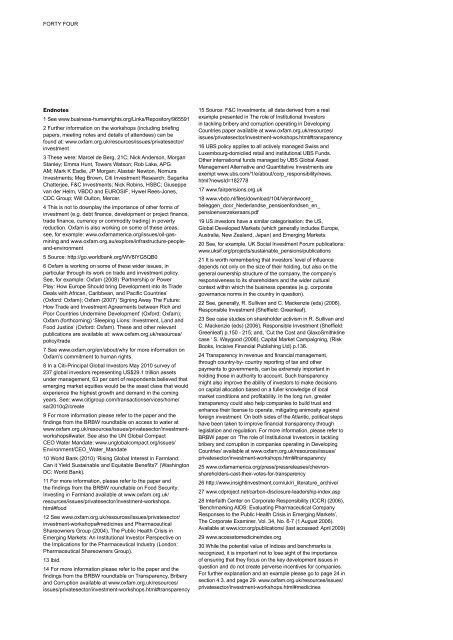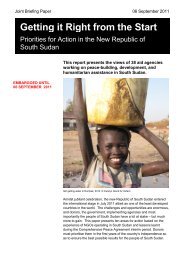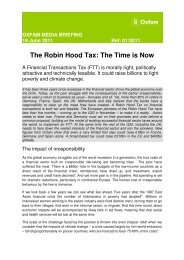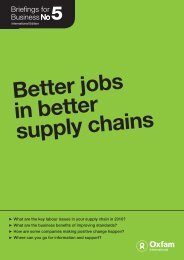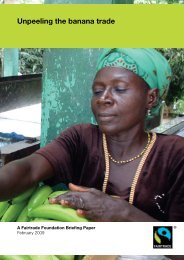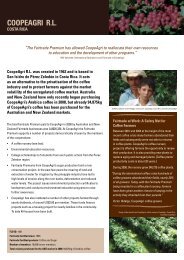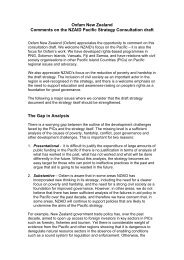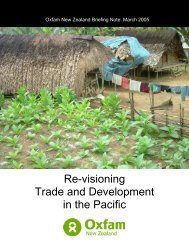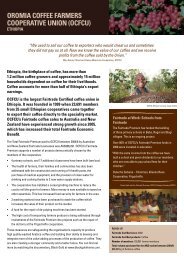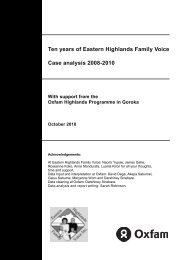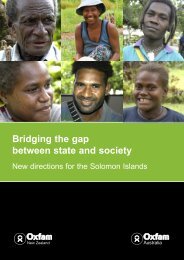Better returns for business.pdf - Oxfam New Zealand
Better returns for business.pdf - Oxfam New Zealand
Better returns for business.pdf - Oxfam New Zealand
- No tags were found...
Create successful ePaper yourself
Turn your PDF publications into a flip-book with our unique Google optimized e-Paper software.
FORTY FOUREndnotes1 See www.<strong>business</strong>-humanrights.org/Links/Repository/9655912 Further in<strong>for</strong>mation on the workshops (including briefingpapers, meeting notes and details of attendees) can befound at: www.oxfam.org.uk/resources/issues/privatesector/investment3 These were: Marcel de Berg, 21C; Nick Anderson, MorganStanley; Emma Hunt, Towers Watson; Rob Lake, APGAM; Mark K Eadie, JP Morgan; Alastair <strong>New</strong>ton, NomuraInvestments; Meg Brown, Citi Investment Research; SagarikaChatterjee, F&C Investments; Nick Robins, HSBC; Giuseppevan der Helm, VBDO and EUROSIF; Hywel Rees-Jones,CDC Group; Will Oulton, Mercer.4 This is not to downplay the importance of other <strong>for</strong>ms ofinvestment (e.g. debt finance, development or project finance,trade finance, currency or commodity trading) in povertyreduction. <strong>Oxfam</strong> is also working on some of these areas;see, <strong>for</strong> example: www.oxfamamerica.org/issues/oil-gasminingand www.oxfam.org.au/explore/infrastructure-peopleand-environment5 Source: http://go.worldbank.org/WV8IYG5QB06 <strong>Oxfam</strong> is working on some of these wider issues, inparticular through its work on trade and investment policy.See, <strong>for</strong> example: <strong>Oxfam</strong> (2008) ‘Partnership or PowerPlay: How Europe Should bring Development into its TradeDeals with African, Caribbean, and Pacific Countries’(Ox<strong>for</strong>d: <strong>Oxfam</strong>); <strong>Oxfam</strong> (2007) ‘Signing Away The Future:How Trade and Investment Agreements between Rich andPoor Countries Undermine Development’ (Ox<strong>for</strong>d: <strong>Oxfam</strong>);<strong>Oxfam</strong> (<strong>for</strong>thcoming) ‘Sleeping Lions: Investment, Land andFood Justice’ (Ox<strong>for</strong>d: <strong>Oxfam</strong>). These and other relevantpublications are available at: www.oxfam.org.uk/resources/policy/trade7 See www.oxfam.org/en/about/why <strong>for</strong> more in<strong>for</strong>mation on<strong>Oxfam</strong>’s commitment to human rights.8 In a Citi-Principal Global Investors May 2010 survey of237 global investors representing US$29.1 trillion assetsunder management, 63 per cent of respondents believed thatemerging market equities would be the asset class that wouldexperience the highest growth and demand in the comingyears. See: www.citigroup.com/transactionservices/home/sa/2010q2/create9 For more in<strong>for</strong>mation please refer to the paper and thefindings from the BRBW roundtable on access to water atwww.oxfam.org.uk/resources/issues/privatesector/investmentworkshops#water.See also the UN Global CompactCEO Water Mandate: www.unglobalcompact.org/issues/Environment/CEO_Water_Mandate10 World Bank (2010) ‘Rising Global Interest in Farmland:Can it Yield Sustainable and Equitable Benefits?’ (WashingtonDC: World Bank).11 For more in<strong>for</strong>mation, please refer to the paper andthe findings from the BRBW roundtable on Food Security:Investing in Farmland available at www.oxfam.org.uk/resources/issues/privatesector/investment-workshops.html#food12 See www.oxfam.org.uk/resources/issues/privatesector/investment-workshops#medicines and PharmaceuticalShareowners Group (2004), The Public Health Crisis inEmerging Markets: An Institutional Investor Perspective onthe Implications <strong>for</strong> the Pharmaceutical Industry (London:Pharmaceutical Shareowners Group).13 Ibid.14 For more in<strong>for</strong>mation please refer to the paper and thefindings from the BRBW roundtable on Transparency, Briberyand Corruption available at www.oxfam.org.uk/resources/issues/privatesector/investment-workshops.html#transparency15 Source: F&C Investments; all data derived from a realexample presented in The role of Institutional Investorsin tackling bribery and corruption operating in DevelopingCountries paper available at www.oxfam.org.uk/resources/issues/privatesector/investment-workshops.html#transparency16 UBS policy applies to all actively managed Swiss andLuxembourg-domiciled retail and institutional UBS Funds.Other international funds managed by UBS Global AssetManagement Alternative and Quantitative Investments areexempt www.ubs.com/1/e/about/corp_responsibility/news.html?newsId=18277817 www.fairpensions.org.uk18 www.vbdo.nl/files/download/104/Verantwoord_beleggen_door_Nederlandse_pensioenfondsen_en_pensioenverzekeraars.<strong>pdf</strong>19 US investors have a similar categorisation: the US,Global Developed Markets (which generally includes Europe,Australia, <strong>New</strong> <strong>Zealand</strong>, Japan) and Emerging Markets.20 See, <strong>for</strong> example, UK Social Investment Forum publications:www.uksif.org/projects/sustainable_pensions/publications21 It is worth remembering that investors’ level of influencedepends not only on the size of their holding, but also on thegeneral ownership structure of the company, the company’sresponsiveness to its shareholders and the wider culturalcontext within which the <strong>business</strong> operates (e.g. corporategovernance norms in the country in question).22 See, generally, R. Sullivan and C. Mackenzie (eds) (2006),Responsible Investment (Sheffield: Greenleaf).23 See case studies on shareholder activism in R. Sullivan andC. Mackenzie (eds) (2006), Responsible Investment (Sheffield:Greenleaf) p.150 - 215; and, ‘Cut the Cost and GlaxoSmithklinecase ‘ S. Waygood (2006), Capital Market Campaigning, (RiskBooks, Incisive Financial Publishing Ltd) p.136.24 Transparency in revenue and financial management,through country-by- country reporting of tax and otherpayments to governments, can be extremely important inholding those in authority to account. Such transparencymight also improve the ability of investors to make decisionson capital allocation based on a fuller knowledge of localmarket conditions and profitability. In the long run, greatertransparency could also help companies to build trust andenhance their license to operate, mitigating animosity against<strong>for</strong>eign investment. On both sides of the Atlantic, political stepshave been taken to improve financial transparency throughlegislation and regulation. For more in<strong>for</strong>mation, please refer toBRBW paper on ‘The role of Institutional Investors in tacklingbribery and corruption in companies operating in DevelopingCountries’ available at www.oxfam.org.uk/resources/issues/privatesector/investment-workshops.html#transparency25 www.oxfamamerica.org/press/pressreleases/chevronshareholders-cast-their-votes-<strong>for</strong>-transparency26 http://www.insightinvestment.com/uk/ri_literature_archive/27 www.cdproject.net/carbon-disclosure-leadership-index.asp28 Interfaith Center on Corporate Responsibility (ICCR) (2006),‘Benchmarking AIDS: Evaluating Pharmaceutical CompanyResponses to the Public Health Crisis in Emerging Markets’,The Corporate Examiner, Vol. 34, No. 6-7 (1 August 2006).Available at www.iccr.org/publications/ (last accessed: April 2009)29 www.accesstomedicineindex.org30 While the potential value of indices and benchmarks isrecognized, it is important not to lose sight of the importanceof ensuring that they focus on the key development issues inquestion and do not create perverse incentives <strong>for</strong> companies.For further explanation and an example please go to page 24 insection 4.3. and page 29. www.oxfam.org.uk/resources/issues/privatesector/investment-workshops.html#medicines


